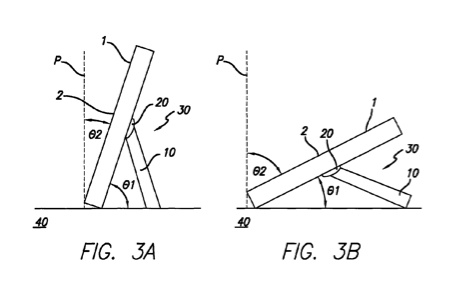Two Apple patents have appeared at the U.S. Patent & Trademark Office that hint that Apple is at least investigating touch screen Macs. For example, patent number 8118274 is a support mechanism for supporting an object on a surface is disclosed.
The support mechanism includes a joint connected to the object; and a stand connected to the joint. The joint may selectively rotate to allow the stand to support the object on the surface in: a first position comprising a landscape orientation at a first angle between the object and the surface, a second position comprising a landscape orientation at a second angle between the object and the surface, a third position comprising a portrait orientation at a third angle between the object and the surface, and a fourth position comprising a portrait orientation at a fourth angle between the object and the surface. The inventors are Stephen R. McClure and Joshua D. Banko.
Here’s Apple’s summary of the invention: “In an embodiment, the invention relates to a support mechanism for supporting an object on a surface. The support mechanism includes a joint connectable to the object; and a stand connectable to the joint. The joint may selectively rotate to allow the stand to support the object on the surface in: a first position comprising a landscape orientation at a first angle between the object and the surface, a second position comprising a landscape orientation at a second angle between the object and the surface, a third position comprising a portrait orientation at a third angle between the object and the surface, and a fourth position comprising a portrait orientation at a fourth angle between the object and the surface. The joint may comprise a socket connected to the object, a ball, and a linking member connected to the ball.
“In another embodiment, the invention relates to a support unit for supporting an object on a surface. The support unit includes a housing connectable to the object; a joint disposed at least partially within the housing; and a stand operatively connected to the joint for supporting the object on a surface. The support unit may include a linking member connecting the joint to the housing.
“The stand is adapted to support the object in a portrait support orientation at a first support angle greater than about 45 degrees between the object, a portrait support orientation at a second support angle less than about 45 degrees between the object and the surface, a landscape support orientation at a third support angle greater than about 45 degrees between the object and the surface, and a landscape support orientation at a fourth support angle less than about 45 degrees between the object and the surface.
“In another embodiment, the invention relates to a display apparatus. The display apparatus includes a device having a visual display and a housing; a cam track formed in the device housing; a joint operatively connected to the cam track; and a stand connected to the joint for supporting the device, wherein the joint rotates the stand between a first support orientation at a first viewing angle of the visual display and in a second support orientation at a second viewing angle of the visual display. In one embodiment, the first viewing angle is different from the second viewing angle. In one embodiment, the first support orientation is the same as the second support orientation.
“In a further embodiment, the invention relates to a computer having a housing and a visual display with a variable viewing angle defined by the position of the display and a vertical plane. The computer comprises: a socket operatively connected to the computer; a ball operatively connected to the socket; and a stand connected to the ball for supporting the computer on a surface, wherein the ball and socket rotate the stand between a landscape orientation at a first viewing angle, a landscape orientation at a second viewing angle, a portrait orientation at a third viewing angle, and a portrait orientation at a fourth viewing angle.”
Then there’s patent number 8118269 for a flat panel display using a hinge assembly. Admittedly, it could be a patent granted for the design of the current iMac.
Per the patent, an apparatus for a flat panel is disclosed. The apparatus comprises a flat panel assembly and a hinge mechanism coupled to the flat panel assembly. The hinge mechanism is adaptable to an industry standard mount and a non-industry standard mount. A system and method in accordance with the present invention allows for the replacement of a non-VESA standard compatible display mount with a display mount that is compatible with the VESA standard.
Utilizing the system and method in accordance with the present invention, such a replacement can be accomplished with minimal effort, and in an efficient manner. The inventors are John Ternus, Eric Knopf, Sean Corbin, Brett Degner, Daniele De Iuliis, Shin Nishibori, Amy Aimei Han, Michael David Hillman, Daniel Lynn McBroom, Michael David McBroom and Brian Thomas Sudderth.

